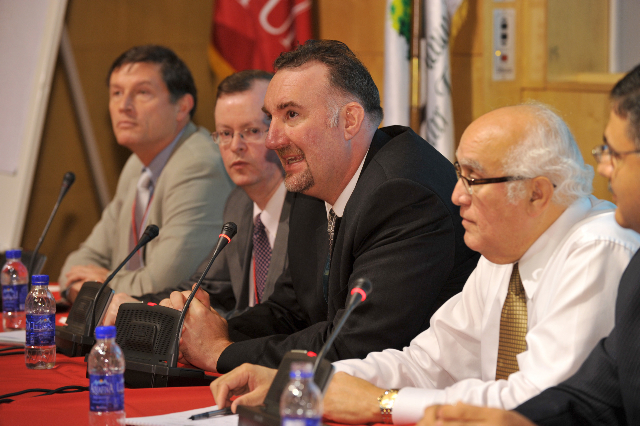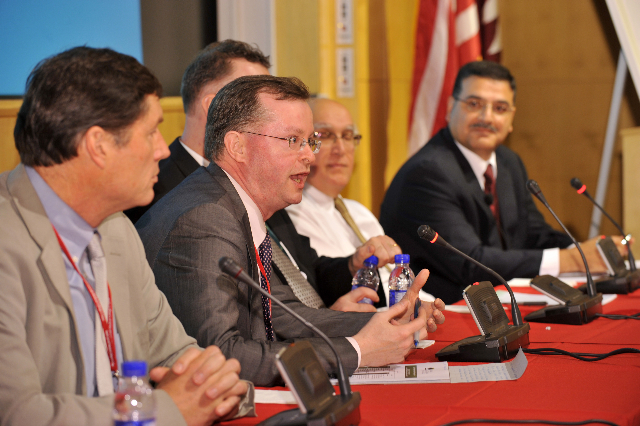Thought Leaders Gather for Intellectual Property Forum
May 2010

A panel of intellectual property experts from Cornell and Qatar
Foundation field questions from the audience about idea regulation, the
patent process and the role of academic research institutions.
The first-ever Qatar Foundation Intellectual Property Forum hosted last week by WCMC-Q drew a full house to the talks and panel discussion by experts about protecting ideas and planning research strategies. Speakers discussed intellectual property (IP) regulations as a way to not only protect ideas but also create visibility in the field of discovery and allow for effective planning strategies.
“With 2.8 percent of Qatar’s national GDP dedicated to invention and innovation, we realize even at this early stage that it’s important to think about how best to tackle intellectual property,” said Dr. Abdelali Haoudi, vice president for research at Qatar Foundation (QF).
The forum, Dr. Haoudi said, was designed to gather the opinions of not only the experts but also the audience, made up largely of executives involved in research projects across QF’s many institutions. He noted also the recent formation of the Foundation’s Strategic Research Board, chaired by Her Highness Sheikha Mozah Bint Nasser Al Missned, “to coordinate and integrate all of the different research projects coming from different centers across Education City.”
As research picks up momentum throughout QF institutions, investigators are looking for ways to maximize the outcome of their hard work. Beyond discovery, they aim to see the information they uncover transformed into products and services that are valuable in society. This transformation is part of the research and development (R&D) process.
“In many instances, for every one dollar of research, it takes 10 dollars to develop it,” said Bowman Heiden, innovation director at Qatar Science and Technology Park. “It is very difficult to take an idea and turn it into something we can use in society without someone investing in its development beyond the research phase.”

“We work to turn ideas into new products and new services that
improve the health of everybody here. IP is critical to that effort.
Without IP protection, there is no investment, no incentive,” says
Dr. Kelly.
Heiden explained that, while many people associate IP laws and management with protection and closed-door policies around ideas, IP is actually a way to create open access to ideas and, through managing knowledge as intellectual assets and mapping them in relation to global actors, analyze and project where the greatest needs for research lies.
“Social development and economic development outcomes are not traditionally the day to day concerns of the people who do research,” Heiden said. “These are considered to be two different concerns—a condition that often produces a zone called the valley of death: where published ideas do not necessarily produce the social and economic development that people believe they should.”
All of the experts agreed that managing ideas at every stage—as if the knowledge were products themselves, and thus intellectual property—creates transparency around the process, motivates researchers and gives them an idea of real-world needs. It also helps to prevent confusion as an idea gains recognition.
“You’d think that ownership would be an easy thing, but it’s not. It becomes possible for a lot of people to potentially be owners of an idea,” Heiden said. “In the end, when something becomes valuable, everyone will claim ownership, and things could get messy for years. IP is a means of managing the mess.”
Additionally, IP has become a sign to funders that researchers have thought their ideas all the way through. It’s become so standard, in fact, that investors often consider it a prerequisite to considering a research proposal.
“The role of academic institutions is to generate and disseminate information—we do this for the public good. I call it knowledge transfer. Technology transfer is part of that mission—a much wider mission—of knowledge transfer,” said Dr. Brian Kelly, director of technology commercialization at the Cornell Center for Technology. “We work to turn ideas into new products and new services that improve the health of everybody here. IP is critical to that effort. Without IP protection, there is no investment, no incentive.”
“Research develops solutions, and solutions will reach society quicker with an IP approach,” Heiden said. “Isn’t that our responsibility? As research ultimately is a means to social end, I see it as my ethical role to concentrate on utilization for the sake of economic and social development.”
The first half of the forum, hosted by Dr. Dirar Khoury, director of institutional research at QF, consisted of three speakers. Bowman Heiden, innovation director at Qatar Science and Technology Park (QSTP) discussed “Ownership, Access and Utilization of Academic Research;” Dr. Abdelkrim Chemseddine, program manager of natural sciences at the Qatar National Research Fund talked about “Current Intellectual Property Policy at QF and QNRF;” and Dr. Magid Abou-Gharbia, chair of the Arab Expatriate Scientists Forum, discussed “Innovation Through Partnership.”
Following the lectures, the forum opened into a panel discussion by Dr. Magid Abou-Gharbia, Mr. Heiden, Dr. Kelly, Enterprise and Commercialization at WCMC, and Dr. Richard Cahoon, CEO of RS Cahoon and Associates and adjunct professor of international programs at Cornell in Ithaca, New York.
Report by Emily Alp
